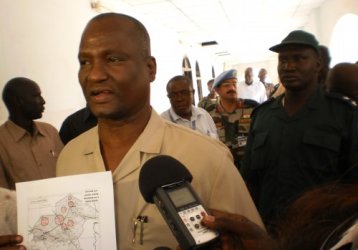Unity State governor calls on citizens to help SPLA defend South Sudan
By Bonifacio Taban Kuich
April 7, 2012 (BENTIU) – Unity State governor, Taban Deng Gai, has appointed mobilisation committees to raise material support for South Sudan’s army (SPLA) so it is prepared for a possible invasion by north Sudan’s military.

South Sudan denies that they attacked first claims their actions were triggered by a ground and air offensive by the Sudan Armed Forces (SAF). On 4 April South Sudan said it had shot down a Sudanese MiG-29 aircraft over Unity State but this was denied by Khartoum.
Also Last week South Sudan’s Oil Minister, Stephen Dhieu, claimed an illegal 25 kilometre pipeline had been discovered running into Unity State from South Kordofan.
Unity State governor Taban Deng has called on all citizens in South Sudan to help the SPLA defend the border. Responding to his call last week Unity State’s nine counties contributed over 200 bulls to the national army and the South Sudan Traders Union over 2,000 food items.
Tunguar Kuenyguong, a local chief in Bentiu town joined the governor in urging Unity State to help fight any incursion into South Sudanese territory.
The chief, who fought in the two-decade civil war between the SPLA – when they were a rebel group – said that he had witnessed border clashes occur on Thursday.
“We don’t want [Sudanese President Omer Hassan Al-]Bashir anymore we are sovereign nation”, further said Kuenyguong.
Since South Sudan seceded last year Juba has claimed that Sudan intends to annex the oil fields of the newly independent nation and is using the South Sudan Liberation Army (SSLA) rebel group to destabilise oil-rich Unity State.
South Sudan’s President Salva Kiir recently appeared to reignite the country’s claim over Heglig. Juba had previously accepted that Heglig is part of South Kordofan State in a ruling of the Permanent Court of Arbitration in The Hague.
A member of the general mobilization committee established by the governor, Rebecca Kur Nyakai, said that Heglig was a part if Unity State on Saturday.
“Heglig is part of Unity State, it was call[ed] Aliny a Payam district of Pariang County, but Khartoum claims it because it produce[s] oil”, the women’s representaive said.
“We are seriously telling Omer El-Bashir to distance his mouth [from] our land, we will support our army by any mean[s] in order for the Heglig to be [under] our control”, said Nyakai.
“Women in the state are seriously moving from one door to another for general mobilization to facilitate the supports of their sons at the frontline in term of voluntaries donation”, Nyakai added.
When South Sudan seceded in July 2011 it took with it 75% of the country’s production severely affecting Sudan’s economy. Heglig produces 60,000 barrels per day, around the half of Sudan’s oil production.
The 1,800km border between Sudan and South is highly militarised and poorly demarcated, with many areas claimed by both sides. The tensions have raised fears of a return to all-out war between the two nations.
Border clashes between the SPLA and SAF and the ongoing conflict between rebels and the Sudanese government in South Kordofan and Blue Nile led Khartoum to announce in March a nationwide mobilisation campaign for its paramilitary group the Popular Defence Forces (PDF).
Mustafa Osman Ismail, an adviser to Sudanese president Omar Al-Bashir, denied that general response to mobilisation was below expectations last week. The numbers signing up were so overwhelming that the government did not have the capacity to take them all, he said.
South Sudan has responded by announcing a mobilisation campaign of its own, although this has only begun in the states that border Sudan.
Despite the efforts of African Union-mediated peace talks in Addis-Ababa the two countries failed to sign a recent deal agreed on security and borders. Bashir was due to sign the deal in Juba on 3 April but cancelled the trip after the attack on Heglig at the end of March.
There are still hopes, however, that the deal – and a separate agreement on citizenship – could still be signed if a summit between Bashir and his South Sudanese counterpart, Salva Kiir, can be rearranged.
(ST)
